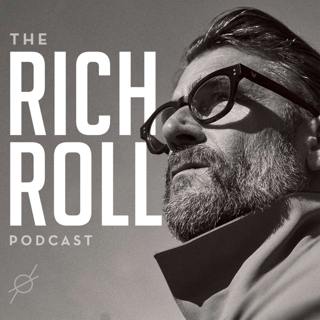
The Best of 2014 (Part 2)
Welcome to Part 2 of our second annual Best of the RRP Anthology series. If you haven't already, I suggest listening to The Best of 2014 Part 1 first. Once again, this is a compendium of some of my favorite conversations of 2014. Our way of saying thanks. Our way of giving back. Our way of trying to catapult you into the new year armed with the information and inspiration required to make it your best year yet. Once again, it's worth reflecting upon the incredible year that was 2014. My blessings are many. My gratitude is overflowing. This is my way way of saying thank you. I appreciate you. Here's to an extraordinary 2015 — the year we manifest our greatest dreams into reality. Join me, and let's do this thing together. Peace + Plants, Rich
1 Jan 20151h 49min

The Best of 2014 (Part 1)
This is the time of year for celebration. This is the time of year for giving back. This is the time of year for gratitude. This is the time of year for reflection. So let's do all those things. Welcome to the second annual Best of the RRP Anthology. This is our way of reflecting back. Our way of expressing gratitude. Our way of giving thanks for taking this journey with us. I pride myself on bringing a wide variety of personalities, opinions and attitudes to the show. When I look back over 2014, even I am surprised by how many incredibly interesting and unique people and perspectives I was honored to entertain and share with you. Second listens brought new insights. Another reminder of what a gift this show has been to me. A gift that gives and keeps on giving. A compendium of some of my favorite conversations of 2014, the next two episodes of the podcast are certain to catapult you into the new year inspired. If you’ve been with me all along, these offerings will bring certain insights back into the forefront of your consciousness as you contemplate your trajectory heading into the new year. If you're new to the show, then these episodes will definitely inspire you to peruse the catalog and listen in full to some of the guests and or episodes you may have missed. Links to the full episodes excerpted in this anthology are enumerated below. It has been an incredible year. My blessings are many. My gratitude is overflowing. This is my way way of saying thank you. I appreciate you. Here's to an extraordinary 2015 — the year we manifest our greatest dreams into reality. Join me, and let's do this thing together. Peace + Plants, Rich
29 Dec 20141h 45min

High Performance Psychologist Michael Gervais on How To Master Mindfulness in Sports & Life
At the highest echelons of sport, all the athletes are supremely talented. All have devoted their lives to being the best they can be. All train as hard as they possibly can. And all are optimizing their sleep, nutrition and recovery to glean every extra edge imaginable. So what distinguishes the gold medalist from the also ran? Is it luck? Talent? Support? Resources? Of course every result is significantly influenced by some combination of these important variables. But all things being equal, the athlete with the mental and emotional edge will stand atop the podium every time. Once the embarrassing last stop on a flailing athlete’s career, the world's top sports psychologists now enjoy a highly influential and respected role proactively honing the mental and emotional edge of today's most successful athletes, CEOs and creatives looking to elevate peak performance beyond the imaginable. Enter Dr. Michael Gervais- the go to high performance psychologist everyone is talking about. Director of the High Performance Psychology arm of DISC (Diagnostic and Interventional Surgical Center) Sports & Spine Center in Marina Del Rey and a key member of the Red Bull High Performance Program, Michael works in the trenches of high-stakes environments, where there is no luxury for mistakes, hesitation, or failure to respond. With the vision of helping his clients thrive under pressure, Michael has created a performance model — melding state-of-the-art brain mapping techniques with an approach grounded in high-performance psychology — that allows people to achieve their maximum potential, whether on or off the field. Dr. Gervais' results are staggering. If you follow the NFL, then you might recall Michael as the guy Seattle Seahawks coach Pete Carroll credits as integral in their Super Bowl win for the meditation, mindfulness and other crucial team building techniques he helped foster and instill into the fabric of the Seahawks organization and team culture that paved the team’s path towards incredible success. You might also remember that Felix Baumgartner’s now-infamous Red Bull Stratos jump from an altitude of 128,000 feet almost never was simply because Felix simply could not overcome the high level of anxiety and claustrophobia he experienced every time he donned the jump suit. It was none other than Gervais who helped Baumagartner resolve the issue and get Stratos back on track. No Gervais, no history making jump. In addition to the Seahawks and Red Bull's North American athletes, Dr. Gervais has worked with the US Olympic Team, snowboarders, golfers, basketball players, track and field athletes, an impressive array of top collegiate programs, and professional sports organizations including the NBA, NFL, NHL, MLB and UFC. In addition, his work has played an integral role in the US Military, as well as several collegiate and high school programs. While Dr. Gervais’ roster includes some of the sports world’s most elite, this isn’t just about high performance athletes, its about high performance life. To coin his phrase,
22 Dec 20141h 59min

How To Pursue Your Dream When Your Partner Is Non-Supportive | Ask Me Anything |
And now for something completely different… In an effort to create a little more intimacy, a little more community, and a little more connection with you — the audience — I thought I would open the show up to your burning questions. Talk about what you want to talk about for a change. A few weeks back I put the word out for question submissions and you responded — our inbox was flooded with e-mails. So here we are. My first spin with a Q&A format. I picked a handful of queries I thought would make for an interesting and broadly applicable discussion, asked Julie to occupy the co-pilot seat (talking into a microphone alone is really hard, and not that fun) and we gave it our all to answer your questions to the best of our collective abilities. Topics discussed and questions answered pivot around the following: How to pursue your dream when your partner is non-supportive; How to escape an unfulfilling career when you don't know what you really want; How to balance physical fitness against spiritual fitness; How to manage extended family put off by your life choices and dietary preferences; and How to raise a healthy toddler plant-based. Special thanks and shoutout to Jen B., Tommy F., Pete D., Dawn and Hugh for the great questions. Not sure about whether or not you want to be identified publicly, so I'm going to err on the side of anonymity. Did you guys like the episode? Is this format something you think I should I do it again? Was it too long? Too short? How about rotating guests for co-pilot duty? If the demand exists and I continue to get great submissions from you, then I’ll keep doing it. Maybe not every week, but we’ll see. In the interim, send your questions for an (anticipated) future episode to: info@richroll.com and leave your comments below. Peace + Plants, Rich
18 Dec 20141h 13min

Have You Ever Been Excited For Now?
IN-Q returns. It's time to question everything. It's time to get excited for now. If you've been on this journey with me for a while, no doubt RRP 81 seared Q into your permanent consciousness. If you’re new to the show, I strongly suggest you give that episode a listen first. Not only is it an epic conversation, it will give you some crucial context and foundation for today's mind meld. Nonetheless, here's a quick breakdown on the impressive IN-Q curriculum vitae: Rapper. Actor. Teacher. Songwriter, TED Talker & internationally revered spoken word artist, IN-Q is a national poetry slam champion who has shared the stage with people like Barack Obama, De La Soul, Eminem, The Red Hot Chili Peppers, John Legend and even Cirque du Soleil. He has toured over 70 colleges; written songs for Miley Cyrus, Rock Mafia, Selena Gomez and Aloe Blacc and has been featured on virtually every TV network from A&E to ABC, including HBO’s Def Poetry Jam and Versus & Flow. Why is a spoken word poet guesting on a health & wellness podcast? Because wellness isn't just diet, exercise and yoga mats. Someone who is truly “well” exudes positivity, soul, spirit, honesty, service, selflessness and integrity from their very core. IN-Q represents a life fully expressed – spreading a message of healing, love and positivity in service to others. Not only is IN-Q a man living his most authentic self, he is what I would call the very definition of health. On January 15, for one night only, IN-Q will be performing at the beautiful Mark Taper Forum in downtown Los Angeles. It is going to be an epic evening (I'll definitely be there), so if you are in town that day I strongly suggest you pick up tickets now — it will definitely sell out and it's a one time deal not to be missed. For tickets and additional information on this one time performance, go to in-q.com.* If you can't make the show, then this podcast is the next best thing. IN-Q is a special guy — touched in a very real, tactile way. I aspire to this man's openness, grace, and attitude of gratitude. It's an honor to spend time with him and I am so pleased to bring his message to you once again. An incredible storyteller, his message will leave you reevaluating your priorities, rethinking your path and ultimately indelibly changed. As the man himself just might say: get excited for now and question everything. I sincerely hope you enjoy the conversation. Let me know what you think in the comments section below. Peace + Plants, Rich
15 Dec 20141h 28min

Your Imperfections Make You Human. Your Humanity Makes You Influential (Part 2)
Welcome back for Part 2 of my conversation with Teen Whisperer Josh Shipp. You haven't listened to Part 1 yet? Go do that first, then come on back. It will save me some explaining. But as long as we're on the subject, let's recap the situation. Josh is a recognized teen behavior expert well known for helping adults understand teens and teens understand themselves. He’s worked with, appeared on and/or contributed to MTV, CNN, FOX, The New York Times, 20/20, Anderson Cooper Live, Oprah.com and Good Morning America. In 2009 Josh was named to Inc. magazine's “30 Under 30″ of successful entrepreneurs. He has lectured at Harvard, Stanford, UCLA and MIT, starred in two documentary-style television series and authored two books: The Teen's Guide to World Domination and Jump Ship. If you did listen to my intro and outro to Part 1, then you know Josh challenged me to remove e-mail and social media from my iPhone as a means of increasing my overall productivity and enhancing the quality of my interpersonal interactions. Today is day 3 and as Josh so adeptly predicts in this second part of our conversation, I am indeed twitchy. A little anxious. Scattered and basically just uncomfortable with the whole idea. Why? Because I like being connected at all times. I like the buzz and anticipation of checking social media. And I can easily justify it as part of my job. But this does not mean it's healthy because it isn't. My relationship might not fall into Her (the movie) territory, but it's definitely obsessive compulsive, if not just a downright addiction. What does this remind me of? Rehab. Weathering a detox — or in this case an iDetox – isn't fun. But for me it's familiar territory. I know that if I stick with it, it will pass. I also know that the simple fact I am experiencing withdrawal symptoms is a pretty good indicator that I am onto something. Something I need to do if I want to grow. Monday night I fired an e-mail off to Josh to thank him again for doing the podcast and to let him know Part 1 was live. I closed the note with the following: “P.S. – deleted Twitter, Facebook AND e-mail from my phone. Think I’m going to have a panic attack. Tell me I’ll be OK.” The next morning, Josh replied: “Imagine having Doritos and a green drink sitting in front of you. If you're new to eating clean … you'll grab the Doritos every time, even though you know better. But when the ONLY option is the green drink, you are at first forced to go for it, but then later choose it. We should choose real humans, friends, family, etc. first. But social media is the Doritos. As sad as this is, we have slowly trained ourselves to go to real people LAST instead of first… This is a way of reprograming ourselves.” So true. I've decided to undergo this #iDetox for me, but I also know I'm not alone. This is for the millions of people out there quietly coveting smart ...
11 Dec 20141h 50min

Why Every Kid is One Caring Adult Away From Being a Success Story (Part 1)
The road gets narrower. In sobriety, this phrase gets tossed around early and often. When I was new to recovery, I had no idea what these words meant. Now I catch myself reprising this mantra daily. Translation: left to my own devices, I will unconsciously and obsessively latch onto and lose myself in almost anything that promises to remove me from myself, take me out of the moment, numb my emotions, undermine my productivity and (preferably) isolate me from other humans — this is alcoholism. If I want to grow, I have to be willing to let go of old habits that no longer serve me. The more sober I get, the more certain seemingly innocuous behaviors become problematic — impediments to accessing the best version of myself. Growth requires that such behaviors constantly be assessed, addressed, modified, and in some cases discarded altogether. For me, drugs and alcohol were obviously the first to go. But the inquiry didn't end there. When drugs and alcohol were removed from my system, my dis-ease had to find secondary behavioral weaknesses to exploit — things like how I navigate my relationships and intimacy, how I relate to food, and even how I use television. Changing my diet 8 years ago helped me understand the full extent to which I would use food to medicate and regulate my emotional state — something that never previously even occurred to me. Next up was TV – a perfect way to lose myself in “harmless” entertainment and “not feel” whatever I was experiencing emotionally. So a year ago we pulled the plug on DirectTV. This was not my idea. Like giving up drugs or cheeseburgers, this was not something I wanted to do. It was something I needed to do if I wanted to continue evolving. The detox was brutal. But I can tell you now that I would never go back — my life is way better now without the box. The road continues to grow narrower. My latest struggle? Owning up to the obsessive manner in which I use my iPhone to “check out.” What good is all the meditation and mindfulness work I have been doing if every time I have a free moment I impulsively grab my phone and start addictively scrolling through Twitter, Instagram, Facebook and e-mail? Without a doubt, its become my drug of choice. I am finally willing to admit that the compulsive nature of my relationship with my beloved device is not compatible with the man I would like to become. It's a walk that doesn't meet my talk. Things have to change. So today — thanks exclusively to my provocative conversation with this week's amazing guest — I deleted Twitter, Facebook and e-mail from my iPhone. Holy crap. If you know me, then you know this is not a small thing — I damn near live on my phone. The detox already rivals anything I have previously endured. This fact alone validates my decision, does it not? To be clear, I'm not quitting social media — it has been and continues to be a huge and tremendously valuable part of my daily life. What I am doing is taking Josh's advice (per our conversation) and creating healthy boundaries around my use of these platforms so I can grow. The desired result? Enhanced emotional well being; a reduction in anxiety; an elevation of mindfulness; qualitative improvement in my interpersonal interactions; greater appreciation for the present moment; and last, but hardly least, increased focus and productivity. Enter Josh Shipp. Abandoned by his birth parents before he even left the hospital. At risk foster kid. Victim of serial abuse. Given up on by countless foster parents. From the get go, the deck was stacked against Josh, and the house always wins. Josh's future was essentially predestined to be bleak and devoid of opportunity. Then he met someone who cared.
8 Dec 20141h 46min

To Struggle Is To Be Alive
Lots of excitement and anticipation about today’s guest. One of the most lauded, celebrated and accomplished athletes on the planet, let me introduce you to the guy who can seemingly run forever: Dean Karnazes. We're talking about a guy TIME magazine named one of the “Top 100 Most Influential People in the World.” Men's Fitness magazine hailed him as one of the fittest men on the planet. An internationally recognized endurance athlete, NY Times bestselling author, in demand public speaker, and successful entrepreneur, Dean has pushed his body, mind and spirit to places most people simply cannot fathom. To give you an idea of what Dean is all about, let's briefly run through a few of his ridiculous mind-bending running accomplishments: * Ran 350 miles in under 81 hours foregoing sleep for 3 days; * Ran a marathon in each of the 50 states in 50 consecutive days; * On 11 occasions, ran a 200 mile relay race solo, racing alongside teams of 12; * Won the 4 Desert Race Series in 2008, traversing the Gobi, Antacara, Sahara and Antarctica; * Won the Badwater 135 in 2004 and has run this race 10 times; * Ran 148 miles on a treadmill in 24 hours; and * Ran 3000 miles across the US from Disneyland to NYC in 75 days, running 40-50 miles / day Given all of these feats of astounding endurance and more, Dean is widely lauded as one of the greatest athletes of our time — an accolade deserved if you ask me. But it wasn't alway this way. After success on the track in high school, Dean put running in his rear view in favor of business. But by age 30, he found himself at a spiritual crossroads. Dissatisfied with the successful, comfortable life he had built for himself, he yearned for something more. He yearned for challenge. He yearned for discomfort. He yearned for struggle. Because to struggle is to be alive. After a now famous drunken all night run following his 30th birthday party, the rest is well documented running history. Dean chronicles his discovery and love of running in his bestselling memoir Ultramarathon Man*– a must read for anyone who loves an inspirational story of adversity and personal triumph — and his journey continues in his follow up tomes 50/50*, and Run!* Not enough? Dean is currently hard at work on a new book – a novelized look at the amazing life of Pheidippedes, the legendary Greek who ran from Marathon to Athens to deliver news of a military victory against the Persians, a subject close to Dean’s heart given his Greek heritage. How does Dean do it? Some chalk it up to genetics – a freakishly high lactate threshold; an unnaturally high tolerance for pain; and an unusual ability to tolerate sleep deprivation Setting aside debate on whether these mental and physiological data points are earned or inherited, I feel compelled to say that the answer to this question is far more co...
1 Dec 20142h 13min






















